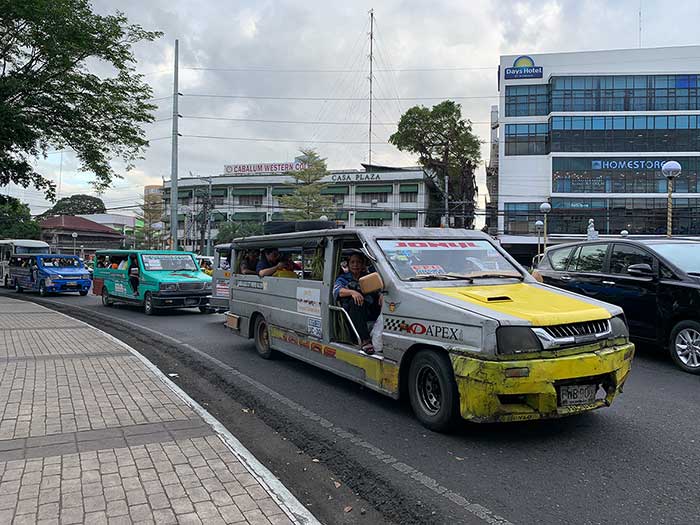
By Rjay Zuriaga Castor
The move to allow unconsolidated Public Utility Vehicles (PUVs) to ply select routes until January 31, 2024 is a deceptive and divisive move, according to the No to PUV Phaseout Coalition-Panay.
The coalition said that the latest memorandum circular of the Land Transportation Franchising and Regulatory Board (LTFRB) misleads and divides the growing unit of PUV operators and drivers opposing the Public Utility Vehicle Modernization Program (PUVMP).
“Ang tan-aw natun, actually isa ina ka maayo nga balita pero sa isa ka bahin, medyo deceptive sa part sang driver and operators natun kay sa isa ka bahin gusto niyo pahupaon ang halos adlaw adlaw nga welga,” said Elmer Forro, lead convenor of the No to PUV Phaseout Coalition – Panay.
[This is actually good news, but on the other hand, it is deceptive on the part of our drivers and operators because the government only wants to quell the transport strikes across the country.]
The LTFRB signed memorandum circular 2023-052 on December 22. The memorandum took effect on December 25.
One of the salient provisions of the recent memorandum is allowing unconsolidated PUVs to operate in areas with less than 60 percent consolidated authorized units until January 31 next year.
“In order not to hamper the operation of public transportation routes without consolidated [transportation service entity], the individual operators in said routes shall be allowed to operate until 31 January 2024,” the memo reads.
Though unconsolidated PUVs are given 30 days or a month to operate, the deadline to consolidate individual franchises into a single franchise under a cooperative or corporation by December 31, 2023 remains in effect.
“Further, all unconsolidated individual operators who failed to file application for consolidation prior to 31 December 2023 shall no longer be allowed to organize into a juridical entity or join consolidated TSEs,” the LTFRB added.
Forro asserted that this only shows that the government only spewed lies by claiming that around 70 percent of PUV drivers and operators have complied with the consolidation requirement as of mid-December.
“Indi gid sila ready kay kung ready sila, ngaa nag-atras pa sila,” he added.
[Obviously, they are not really ready because if they were, why did they have to retract their previous memorandum.]
Forro described this as “divisive,” emphasizing that the allowance is only granted per route.
“Gusto nila tunga tungaon kay ang ila approach diri sa memorandum, indi gani regionalized kundi per city or per area […] Indi tanan nga lugar maka-avail sina nga extension if per area. Divisive siya, makatunga siya snag unity subong sang mga drivers nationwide,” he explained.
[They want division because their approach in this memorandum is not regionalized but rather per city or per area[…] Not all places can avail of this extension if per area. It’s divisive; it divides the unity among operators and drivers nationwide.]
Forro expressed his discontent with LTFRB’s recent memorandum and maintained that they will continue in their call to abolish the consolidation requirement of the PUVMP.
He stressed that the government should revisit and revise the repressive provisions of the PUVMP for the operators, drivers, and commuters.
“Dapat tun-an man nila kung ano ang dapat bag-uhon sa compulsory consolidation nila […] Iaatras kag tun-an, indi nga amo man dyapon. Magapabilin ang problema sina,” he said.
[They should also study what needs to be changed in their compulsory consolidation […] they have to restudy; it shouldn’t remain the same because the problem will just persist.]
Atty. Salvador “Jun” Altura, LTFRB-6 legal officer, previously told Daily Guardian that around 90 percent of PUVs in the region are already consolidated.
Forro agreed with the numbers but claimed that they were only forced to enter a cooperative or corporation.
“Tama ina but then dapat ta man siguro hangpon nga na consolidate ni sila kay gin pilit sila kay kung indi sil mag intra sa cooperative sadto, indi ka man paghatagan sang provisional authority,’ he said.
[That’s correct, but then perhaps we should understand that they consolidated because they were forced to because if they didn’t join a cooperative back then, they wouldn’t be given provisional authority.]
From December 27 to 28, the No to PUV Phaseout Coalition – Panay has put up a protest camp in front of the LTFRB Region 6 office in Jaro district to forward their opposition to the PUVMP.




















